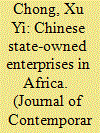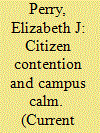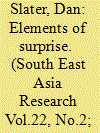| Srl | Item |
| 1 |
ID:
132511


|
|
|
|
|
| Publication |
2014.
|
| Summary/Abstract |
The Barack Obama administration's May 2013 assessment of al Qaeda's weakness and fracturing in the post-bin Laden era has been greeted with indignation by both liberals and conservatives. They believe al Qaeda is stronger than ever in the wake of the Arab Spring. These critics, however, misunderstand the network's dysfunctional direction. Al Qaeda's "resurgence" is likely to lead to its failure. The argument proceeds on four levels: (1) the dramatic growth of the al Qaeda network masks its internal weakness and organizational splintering; (2) the Arab Spring has led to a burst of al Qaeda activism that is likely to undermine its jihadist cause; (3) al Qaeda's fragmentation and its multiple trajectories in the post-9/ 11 era violate bin Laden's original intent and are beyond al Qaeda Central's direction; and (4) the dysfunctional nature of al Qaeda's ideology and its excessive reliance on takfiri violence is paradoxically a source of both persistence and failure.
|
|
|
|
|
|
|
|
|
|
|
|
|
|
|
|
| 2 |
ID:
133811


|
|
|
|
|
| Publication |
2014.
|
| Summary/Abstract |
The role of Chinese state-owned enterprises (SOEs) in Africa is puzzling: they pioneered China's inroads into Africa and shouldered the responsibilities of building and expanding cooperation with African countries, while these very activities and engagement, according to many scholars, often contradict or even undermine the political and diplomatic objectives adopted by the central government. To understand this puzzle, this article unpacks China's engagement in Africa, by examining large central SOEs in the resources and infrastructure sectors. It concludes that the commitment of large SOEs in Africa relies on small public and private contractors. The paradox therefore is, that while the central government encourages and supports the large SOEs to 'go global', it has limited capacity to control and regulate the small contractors.
|
|
|
|
|
|
|
|
|
|
|
|
|
|
|
|
| 3 |
ID:
133997


|
|
|
|
|
| Publication |
2014.
|
| Summary/Abstract |
Civil society in contemporary China presents a perplexing paradox. Despite the brutal suppression of the 1989 Tiananmen uprising, social contention and associational activism swelled over the ensuing years. One might have expected the ruthless June Fourth repression of the massive student movement to have deterred subsequent dissent, but in fact the frequency of protest has steadily escalated in the past 25 years. Moreover, China today is host to countless grassroots (as well as government-sponsored) nongovernmental organizations (NGOs), foundations, and charities-not to mention a vibrant sphere of online public debate. In contrast to 1989, a nascent civil society can now be said to exist.
|
|
|
|
|
|
|
|
|
|
|
|
|
|
|
|
| 4 |
ID:
133118


|
|
|
|
|
| Publication |
2014.
|
| Summary/Abstract |
If anything is more surprising than Burma's recent adoption of democratic reforms, it is that military rule lasted so long without such reforms in the first place. This article considers this paradox from both a country-specific and comparative-theoretical perspective, and argues that both perspectives are essential for analysing Burma's uncertain reform process as it unfolds or unravels. It portrays the top-down reform process as one of double-edged détente between the ruling Tatmadaw and its internal rivals as well as its external critics. This détente is inherently fragile because it rests on the current regime's confidence that democratization will produce neither serious instability nor even its own decisive defeat. Events that shake the Tatmadaw's 'victory confidence' and 'stability confidence' should thus pose the greatest risk that reforms will be stalled or reversed.
|
|
|
|
|
|
|
|
|
|
|
|
|
|
|
|
| 5 |
ID:
131635


|
|
|
|
|
| Publication |
2014.
|
| Summary/Abstract |
This article examines how the governance of justice and internal security in Scotland could be affected by the outcome of the Scottish independence referendum in September 2014. The article argues that it is currently impossible to equate a specific result in the referendum with a given outcome for the governance of justice and internal security in Scotland. This is because of the complexities of the current arrangements in that policy area and the existence of several changes that presently affect them and are outside the control of the government and of the people of Scotland. This article also identifies an important paradox. In the policy domain of justice and internal security, a 'no' vote could, in a specific set of circumstances, actually lead to more changes than a victory of the 'yes' camp.
|
|
|
|
|
|
|
|
|
|
|
|
|
|
|
|
| 6 |
ID:
132951


|
|
|
|
|
| Publication |
2014.
|
| Summary/Abstract |
China's relatively recent dramatic increase in forest area has been hailed domestically and globally as one of the world's few environmental success stories, but significant problems remain in China's reforestation efforts. We describe the challenges that China still faces if it is to meet its laudable - but sometimes contradictory - goals for its forest sector: improving rural livelihoods, sustaining and restoring ecosystem services, and increasing output of the forest product-dependent manufacturing and construction sectors. We do so while pointing out the unintended consequences of implementing these policy goals: overstatement of the quantity and quality of the forest recovery, domestic human and ecological costs of the reforestation, and externalization of China's continually growing demand for timber and forest products in the form of increased imports from vulnerable forests in other parts of the world.
|
|
|
|
|
|
|
|
|
|
|
|
|
|
|
|